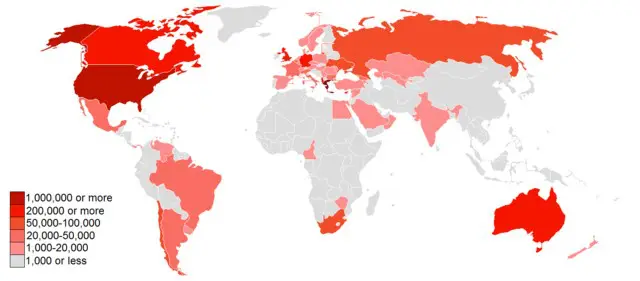Which Countries In The World Speak Greek? And How Many Greek Speakers Are There?
The Greek language is an extremely important language in terms of world history, culture and philosophy. Most western languages today have Greek loan-words, especially for scientific terms, which attests to the significance of Greece and its culture and language throughout the ages.
Greek is not, however, an international language like English, French, Arabic or other languages that historically spread around the world and became dominant in multiple continents.
There are around 13,5 million Greek speakers in the world. Only two countries have a Greek-speaking majority. The most of the world’s Greek speakers live in Greece, a country with a little under 11 million inhabitants, and then there’s Cyprus, which has around 1,2 million Greek speakers.
But there are a few other countries in the world that has significant Greek-speaking communities. In the following, I’ll get into those that have the more important communities.
Greece, the cradle of the Greek language.
The Greek language has the longest documented history of any living Indo-European language. It’s been in continuous use for at least 3500 years in Greece, and that’s where 13,5 million Greeks still speak it today.
Greece is the primary Greek-speaking nation to this day, and it will probably stay that way.
Join over 50,000 other Greek learners
Let me help you learn Greek (I'll also show you my favorite Greek resources for learning quickly and efficiently).
Do you want in?
No spam. Ever.
You might also be interested in reading “Is Greek or Ancient Greek a Dead Language?
Cyprus, the second largest Greek-speaking nation.
Cyprus is a small country on an island in the eastern part of the Mediterranean Sea, which means that it’s geographically part of the Middle East. The country is, along with Greece one of the only two primarily Greek-speaking countries in the world. It has around 1,2 million native Greek speakers.
Greek speakers outside of Greece and Cyprus
Since antiquity, the Greek people have traveled and explored the world. This also meant that communities of Greek people settled in most corners of the globe. While millions of people world-wide can trace back their Greek descent, most have since lost the Greek language and assimilated to their host countries.
However, some Greek-speaking communities around the world do remain to this day.

Map showing world countries with the largest populations of people with Greek descent.
Map borrowed from Wikipedia.
In the United States a little more than 300,000 Americans speak Greek. The number of Greek descendants is much higher, but since the majority of the US Greek population immigrated to America in the 1800’s and the 1900’s many have lost their heritage language.
in Australia around 240,000 people speak Greek. Around 400,000 Australians are reported to have Greek ancestry, so the high number of Greek speakers is impressive given that Greek immigration to Australia has been going on since the early 1800’s. Later great waves of immigration came during the Greco-Turkish wars and the two world wars where Greeks had to flee their native soil.
Albania, Greece’s neighbor has a significant Greek minority, especially in its southern regions. It is unclear exactly how big the Greek population in Albania is, and estimates vary from under 100,000 to over 300,000. The Greek dialect in Albania is said to be a version of the Greek language spoken in southern Greece during Ottoman rule. Today, much of the Albanian Greek’s vocabulary consists of words that are no longer in use in Greece and Cyprus (see Talk In Albanian to learn more about this language).
Except for the above countries, most nations that reportedly have a Greek minority only have quite small numbers of Greek speakers.
According to the European Commission’s Europameter’s data the following populations of Greek speakers exist in Europe.
- United Kingdom: 254,000
- Italy: 109,000
- Bulgaria: 93,000, 1,33%
- Poland: 46,000, 0,12%
- Austria: 41,000, 0,46%
- Romania: 35,000, 0,18%
- Hungary: 13,000, 0,13%
- Sweden: 11,000, 0,11%
- Portugal: 9,300, 0,09%
- Ireland: 8,300, 0,17%
- Denmark: 6,400, 0,11%
- Lithuania: 5,600 , 0,20%
- Finland: 3,900, 0,07%
- Slovenia; 2,000, 0,10%
- Estonia: 1,600, 0,12%
Outside of the European Union, there are small communities in Ukraine, 5,800 and Turkey, 3,600. Countries such as Argentina and South Africa are said to have Greek minorities too, but their numbers are very small.
So that’s about it. There are two countries in the world that speak mainly Greek, Greece and Cypress, but there are a lot of countries with more or less small communities of Greek immigrants who still speak Greek.
If you’re interested in learning Greek yourself, I recommend that you go read my guide called “How To Learn Greek By Yourself”.

